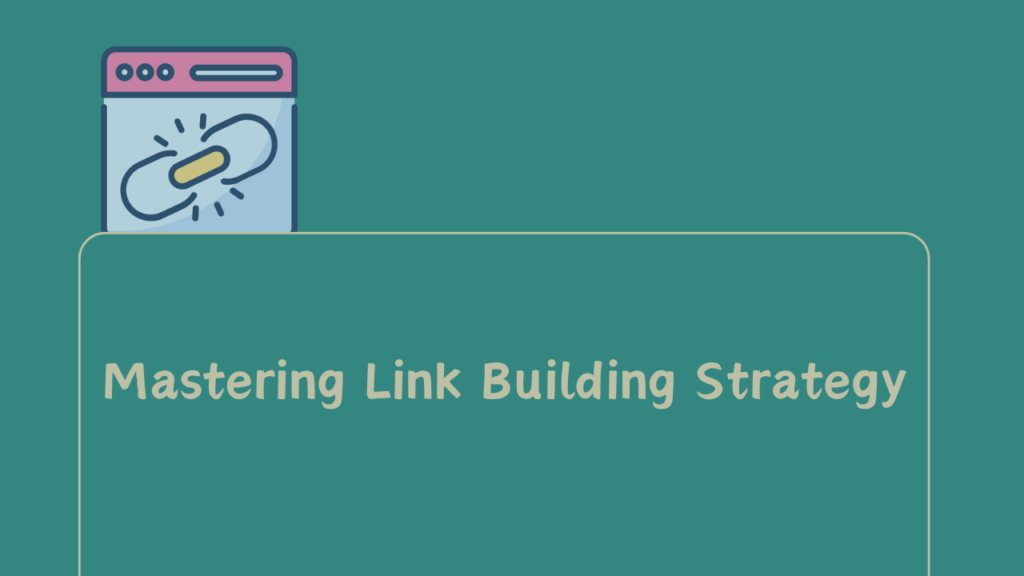In the evolving world of SEO, backlinks building remains a foundation of a successful online marketing strategy. It can be difficult for people who are new to link building. However, you may increase the authority of your website and increase large traffic to it with an organized strategy and the right strategy. This blog post will guide you over the fundamentals of mastering link building strategy and offer easy steps to get your plan off to a quick start.

1. Understanding Link Building
Acquiring links to your website from other websites is known as link building. Search engines consider these links as a vote of trust from a particular site to another, indicating to them that your information is reliable and useful. In basic terms, search engines are more likely to rank your content higher depending on how many high-quality links are pointing to your website.
2. Setting Your Link Building Goals
Before diving into link building, it’s crucial to set clear objectives. What do you hope to achieve with your link building efforts? Common goals include:
Improving Search Engine Rankings: Higher rankings can lead to increased organic traffic.
Driving Referral Traffic: Quality backlinks from relevant sites can drive targeted visitors to your site.
Enhancing Brand Awareness: High-profile backlinks can enhance your brand’s visibility and credibility.
Building Relationships: Networking with other industry players can lead to valuable partnerships and collaborations.
3. Identifying Link Building Strategy
Effective link building starts with identifying potential opportunities. Here are some strategies to find where you can get those coveted links:
Competitor Analysis: Use tools like Ahrefs, SEMrush, or Moz to analyze your competitors’ backlinks. Identify sites linking to them and explore if they might be interested in linking to your content as well.
Industry Directories: Look for reputable industry directories and ensure your site is listed. This not only provides backlinks but also boosts your site’s credibility.
Guest Posting: Reach out to relevant blogs and websites in your industry to offer guest posts. This approach provides an opportunity to include a backlink to your site within high-quality content.
Broken Link Building: Find broken links on other sites and offer your own content as a replacement. This can be done using tools like Check My Links or Broken Link Checker.
Resource Pages: Many websites maintain resource pages or link roundups in your niche. Reach out to these sites and suggest your content as a valuable addition.
4. Creating Link-Worthy Content
To attract high-quality backlinks, you need to create content that is not only valuable but also shareable. Consider these types of content:
In-Depth Guides and Tutorials: Comprehensive and well-researched guides can become go-to resources in your industry.
Infographics: Visual content like infographics is often shared and linked to more frequently.
Original Research and Data: Unique data and research can attract links from industry publications and blogs.
Case Studies: Detailed case studies showcasing real-world results can be highly valuable to your audience.
5. Building Relationships
Building relationships with influencers, bloggers, and industry experts can facilitate natural link building. Here’s how you can do it:
Engage on Social Media: Follow and interact with industry influencers and publications. Share their content and participate in discussions.
Networking Events: Attend industry conferences and events to meet potential link-building partners in person.
Personalized Outreach: When reaching out for backlinks, personalize your communication. Highlight how your content provides value and why it would be beneficial to their audience.
6. Monitoring and Measuring Your Success
Link building is an ongoing process, and it’s essential to monitor your progress and measure the effectiveness of your strategy:
Track Backlinks: Use tools like Google Search Console, Ahrefs, or Moz to track your backlinks and ensure they are from reputable sources.
Analyze Referral Traffic: Monitor traffic coming from your backlinks to gauge their effectiveness.
Assess SEO Impact: Evaluate changes in your search engine rankings and organic traffic over time to understand the impact of your link building efforts.
7. Avoiding Common Pitfalls
While link building can be incredibly effective, it’s important to avoid common mistakes:
Avoid Spammy Techniques: Focus on quality over quantity. Avoid link farms or paid links that could harm your site’s reputation.
Stay Away from Irrelevant Sites: Ensure that the sites linking to you are relevant to your industry or niche.
Don’t Neglect Content Quality: High-quality content is the foundation of a successful link building strategy. Ensure your content is valuable and engaging.
8 free SEO tools for optimizations
8 Search Engine Optimization Companies in Birmingham
SEO Strategies for Law Firms
Conclusion
Link building, when done strategically, can significantly enhance your site’s authority, visibility, and traffic. By setting clear goals, identifying opportunities, creating valuable content, and building relationships, you can craft a robust link building strategy that drives results. Remember, the key to success in link building is consistency and a focus on quality.

